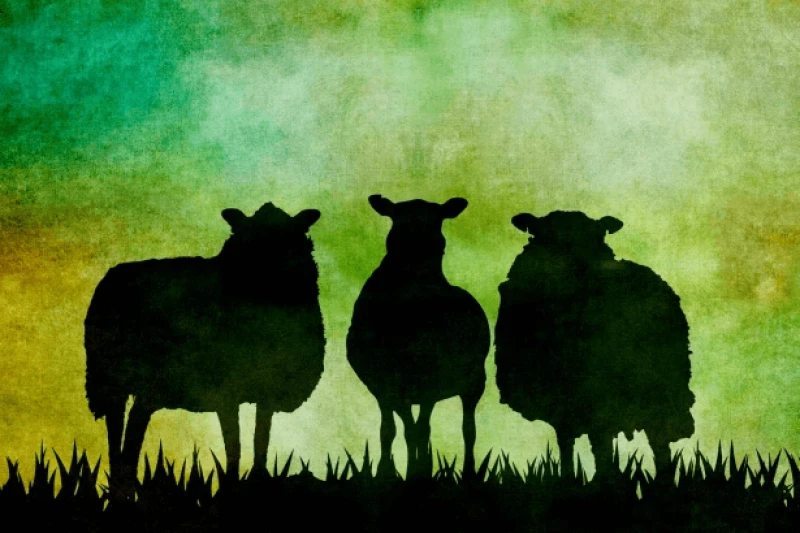Sheep ‘burp’ methane gas, which has 80 times the warming impact of carbon dioxide. Can we genetically engineer them to be more sustainable?
Sheep ‘burp’ methane gas, which has 80 times the warming impact of carbon dioxide. Can we genetically engineer them to be more sustainable?


Farmers are looking to reduce their greenhouse gas emissions in a weird and wonderful way: using genetically engineered, low-methane sheep.
A project named ‘Breed for CH4nge’ has been announced in the U.K., pledging £2.9 million—$3.7 million—to breed sheep to emit as little methane as possible, helping farming get closer to net zero emissions.
Methane is a greenhouse gas, which is around 80 times more powerful as a heat-trapping insulator in our atmosphere than CO2 over a 20-year period.
…
This project is led by genetics company Innovis and funded by the U.K. government’s Farming Innovation Fund, and is a three-year initiative that plans to measure the methane emissions of 13,500 sheep in 45 flocks, to determine the efficiency of the sheep as of now.
They then plan to analyze this data, as well as data on the size of the sheep’s rumen [part of the stomach] and microbiota [microscopic organisms in the gut], to rank the sheep in terms of methane emissions, feeding efficiency, and health. DNA sampling will also allow researchers to study the relationships of these traits with the sheep genome.
The highest scorers on this Estimated Breeding Value (EBV) scale will be selectively bred over multiple generations to create sheep that are still healthy and useful to farmers, but produce less methane than before.
This is an excerpt. Read the original post here

 | Videos | More... |

Video: Nuclear energy will destroy us? Global warming is an existential threat? Chemicals are massacring bees? Donate to the Green Industrial Complex!
 | Bees & Pollinators | More... |

GLP podcast: Science journalism is a mess. Here’s how to fix it

Mosquito massacre: Can we safely tackle malaria with a CRISPR gene drive?

Are we facing an ‘Insect Apocalypse’ caused by ‘intensive, industrial’ farming and agricultural chemicals? The media say yes; Science says ‘no’
 | Infographics | More... |

Infographic: Global regulatory and health research agencies on whether glyphosate causes cancer
 | GMO FAQs | More... |

Why is there controversy over GMO foods but not GMO drugs?

How are GMOs labeled around the world?

How does genetic engineering differ from conventional breeding?
 | GLP Profiles | More... |

Alex Jones: Right-wing conspiracy theorist stokes fear of GMOs, pesticides to sell ‘health supplements’




 Viewpoint — Fact checking MAHA mythmakers: How wellness influencers and RFK, Jr. undermine American science and health
Viewpoint — Fact checking MAHA mythmakers: How wellness influencers and RFK, Jr. undermine American science and health Viewpoint: Video — Big Solar is gobbling up productive agricultural land and hurting farmers yet providing little energy or sustainabilty gains
Viewpoint: Video — Big Solar is gobbling up productive agricultural land and hurting farmers yet providing little energy or sustainabilty gains Fighting deforestation with CO2: Biotechnology breakthrough creates sustainable palm oil alternative for cosmetics
Fighting deforestation with CO2: Biotechnology breakthrough creates sustainable palm oil alternative for cosmetics Trust issues: What happens when therapists use ChatGPT?
Trust issues: What happens when therapists use ChatGPT? California, Washington, Oregon forge immunization alliance to safeguard vaccine access against federal undermining
California, Washington, Oregon forge immunization alliance to safeguard vaccine access against federal undermining 30-year-old tomato line shows genetic resistance to devastating virus
30-year-old tomato line shows genetic resistance to devastating virus The free-range chicken dilemma: Better for birds, but with substantial costs
The free-range chicken dilemma: Better for birds, but with substantial costs ‘You have to treat the brain first’: Rethinking chronic pain with Sanjay Gupta
‘You have to treat the brain first’: Rethinking chronic pain with Sanjay Gupta
